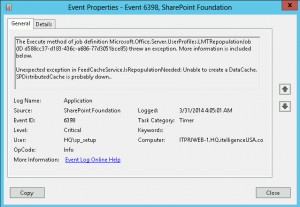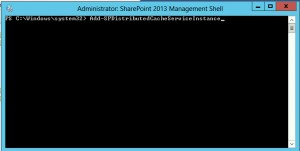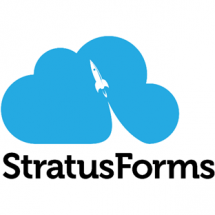If you are seeing timer job failures for
CD User Profile Service – Feed Cache Repopulation Job
and/or errors in your server event log when you run a user profile sync
Error 6398
The Execute method of job definition Microsoft.Office.Server.UserProfiles.LMTRepopulationJob threw an exception. More information is included below.
Unexpected exception in FeedCacheService.IsRepopulationNeeded:Unable to create a DataCache. SPDistributedCache is probably down.
then you may need to configure the Distributed Cache for SharePoint Server 2013. I have noticed several clients now that have an event log full of errors since this configuration is not part of the setup wizard and you may not know to go set it up.
—Distributed Cache provides in-memory caching services to several features in SharePoint Server 2013 – including newsfeeds, authentication, OneNote client access, security trimming and page load performance. Blob cache and output cache do not use the distributed cache service. Needless to say, you want this enabled in most cases!
Setting up the distributed cache is easy in a small or medium farm. Simply run the following command from the SharePoint 2013 Management Shell (PowerShell) on the application and web front end servers:
Add-SPDistributedCacheServiceInstance
If it runs successfully, it will return to command prompt with no further messages.
By default, 5% of server memory is automatically allocated to the Distributed Cache service’s cache size. However this percentage can be modified. Even small to medium farms may need to adjust this in some situations.
For larger farms, some planning and consideration should be given on which servers should have distributed cache enabled and how much memory should be allocated.
More detailed information about Distributed Cache planning can be found here: http://www.microsoft.com/en-us/download/details.aspx?id=35557
Additional information about managing and maintaining the Distributed Cache service can be found here: http://technet.microsoft.com/en-us/library/jj219613(v=office.15).aspx














